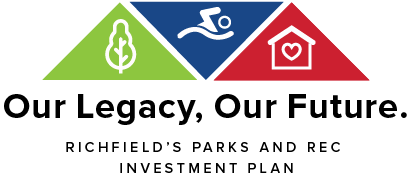
Cost and Tax Impact
Paying for this Community Investment
The city has put forward an $80 million investment plan to support repairs and improvements at three major parks and rec destinations. Under this plan, the funds would be allocated as follows: $45 million for the Richfield Community Center, $26 million for the Wood Lake Nature Center, and $9 million for Veterans Park.
The city will finance the projects through three primary funding sources:
A half-percent local sales tax: The MN Legislature authorized the city to seek voter approval of a half-percent local sales tax to generate $65 million, plus financing costs, to help fund the three projects.
State funding: To support the pre-design and construction of a new educational facility at Wood Lake Nature Center, the city has already secured $12 million in state funding that requires a one-to-one match to be used.
Federal funding: An additional $3 million in federal funds has been awarded to the Wood Lake Nature Center project and must be used by September 2031 or be returned.
Richfield residents would only pay about one-third of the construction of the projects when factoring in nonresident contributions from the sales tax and state and federal funding.
Three Primary Funding Sources
Why a Local Sales Tax?
The City Council determined that a local sales tax was the best primary funding option because the tax would spread the cost among residents and nonresidents who often use public amenities. If the city used a property tax increase, the cost would be put solely on Richfield taxpayers.
According to research by the University of Minnesota Extension Center, 55% of the local sales tax would be paid by nonresidents who make purchases in the city. That means approximately $35.75 million of the $65 million collected through sales tax would be paid by nonresidents.
Half-Percent Local Sales Tax Break Down
How a Local Sales Tax Works
The local sales tax is not permanent and would expire within 20 years or when the total cost of the approved projects has been repaid, whichever happens sooner.
The average cost of the local sales tax per Richfield resident would be $3.92 per month, or $46.99 per year, according to a recent study by the University of Minnesota.
If the city were to use a property tax increase to fund these projects instead of a local half-percent sales tax, the owner of an average-valued home in Richfield would pay roughly an additional $250 per year in property taxes ($20.83 per month).
The city cannot use the sales tax for anything other than the approved projects.
The amount collected cannot change without approval from local voters.
Sales Tax Exemptions
The local sales tax includes the same exemptions as the state sales tax, including agricultural items, farm equipment, motor vehicles, clothing, groceries, baby products, and feminine hygiene products. The Minnesota Department of Revenue provides a full list of nontaxable items, here.


